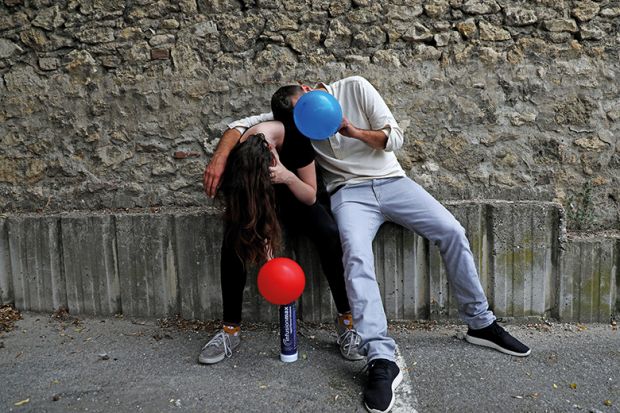The two blokes sitting in the car park were each holding balloons. But this was no pop-up party. As I got closer, I saw that one of them was also grasping what appeared to be a blowtorch. Not good.
Luckily, the blowtorch turned out only to be a can of nitrous oxide, also known as laughing gas; I hadn’t recognised it as such because it was the largest can of the stuff I’d seen in all my years as a university security guard. The gas usually comes in those small 8g cylinders you see lying around park benches on Sunday mornings – but these two blokes were holding the best part of a kilo.
Having determined that they weren’t students and were, in fact, lost on their way to a gig in the city, I got them both off campus, explaining that they’d have more chance of getting the cab they were waiting for if they could be seen from the road.
But they’ll be laughing on the other sides of their faces if I see them again. From today, nitrous, as it’s popularly known, becomes a Class C controlled substance in the UK, joining the ranks of steroids, benzos and the date-rape drug GHB. Security staff and others who aren’t the police are now able to enact private powers of arrest on anyone carrying enough to constitute a supply. This, incidentally, also applies to university teaching staff, should they feel inclined.
In the run-up to the ban, my shift mates and I have been extra vigilant in keeping an eye out for nitrous canisters. Given that laughing gas is the third most used drug among 16- to 59-year-olds in England and Wales, according to NHS data, we’ve been anticipating that people on campus will emulate those blokes in the car park and do some bulk-buying.
The small canisters were previously sold online, not as recreational drugs but as an aid to making whipped cream (hence the “whippets” nickname). Students weren’t allowed to order them to their campus accommodation; like candles, joss sticks and mini fridges, they breached safety regulations. But that didn’t always stop people trying – and I can't tell you how exhausting it is to try to out-argue an undergrad who’s ordered a box of 192 cylinders – mint flavour – and is insisting that they are vital for his culinary arts module. I can only assume that one of his assignments was “make enough whipped cream to sustain the entire next series of Bake Off”.
Campus administrators are firm that there must be a zero-tolerance policy on all drug use, including highs that remain legal. But, as science tutors no doubt tell their thermal physics group, reaching absolute zero can be tricky. And each time guards intercept a nitrous delivery, we’re aware that next time the student customer might go for an even dodgier drug. We recently had to bring the paramedics to a girl who had overdosed on gummies, for instance: imitation sweets treated with cannabidiol, also available online.
Academic staff should familiarise themselves with the appearance of these in case they are ever offered any innocent-looking fruit pastilles by the students in the back row. Inadvertent dosing is also a hazard security guards run: some late-night campus wanderers have quite an array of delights up their sleeves. I once almost suggested in a team meeting that, alongside anti-terror training and tips on better swivel chair posture, security should undergo a “drugs development day” where we’re dosed with a bit of everything – purely in order to better understand what exactly we’re running to.
I’m sure the nursing students would get a kick out of watching us under controlled conditions. I’d probably be like the Royal Marine who, having been required to complete a field exercise after drinking LSD in a 1963 experiment, found himself up a tree attempting to feed the birds.
Some might remark that, by spending money on laughing gas, students are confirming that they have too much disposable income. It’s a viewpoint echoed by wealthy public figures such as TV presenter Kirstie Allsopp, who recently claimed that young people would stand a better chance of getting on the property ladder if they cancelled their subscriptions to gyms and streaming services.
As a bloke on £12.03 per hour, my view is that youngsters buy nitrous and other less psychoactive treats because they know the property ladder is totally out of reach however many streaming services they forgo. Better to have a good time while you can before that harsh reality confronts you – and, in more than a quarter of cases, you have to move back in with your parents.
So unless we get an X-ray machine in the guard room, I expect I’ll be inadvertently signing for dubious deliveries for the foreseeable future. But I can’t help thinking that if students paid more attention in their chemistry lectures, they’d learn that N2O is pretty impractical as a mood-altering substance. Apart from needing pressurised cans, valves and balloons to take it, the high lasts only about a minute: just ask dental patients or women in labour, who have to breathe the gas through a tank to feel the effects.
Still, as those who paid attention in their mechanical propulsion lectures already know, students should be wary of bingeing on a gas that was once used to make a Hyundai Ioniq do 158mph: a truly illegal high.
George Bass is a security guard at a UK university.
Register to continue
Why register?
- Registration is free and only takes a moment
- Once registered, you can read 3 articles a month
- Sign up for our newsletter
Subscribe
Or subscribe for unlimited access to:
- Unlimited access to news, views, insights & reviews
- Digital editions
- Digital access to THE’s university and college rankings analysis
Already registered or a current subscriber? Login








